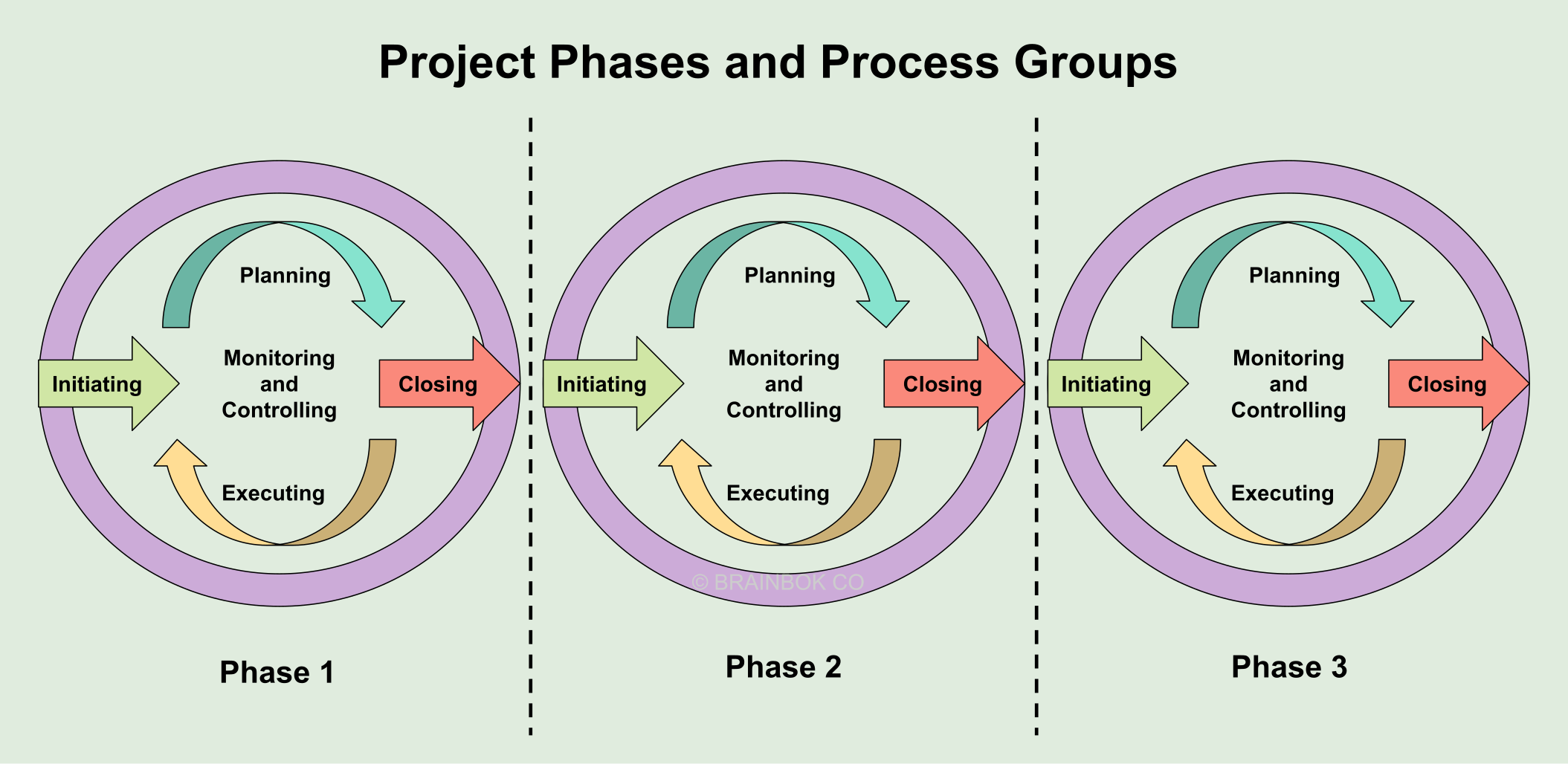Process
Project Management Processes
The project management processes:
- ensure effective flow of the project
- apply globally and across all industry groups
- are not discrete; they often overlap and interact with each other
- are repeated in each phase of a project
The Project Management Institute (PMI®) has defined 49 project management processes for managing projects and categorized them 5 Process Groups and 10 Knowledge Areas.
The Project Management Processes, Process Groups, and Knowledge Areas are part of a framework introduced by PMI and have evolved over several editions of the PMBOK® Guide standard. The processes and the process groups have now been removed from the PMBOK® Guide, 7th Ed and moved to a separate standard called Process Groups: A Practice Guide. The project management processes are a very important part of the PMP® and CAPM® certifications even in 2025.
Inputs, Tools & Techniques, Outputs (ITTOs)
Processes take inputs and convert them into outputs using tools and techniques.
| Inputs | Tools & Techniques | Outputs |
|---|---|---|
| 1. Input A | 1. Technique X | 1. Project Output 1 |
| 2. Input B | 2. Tool Y | 2. Project Output 2 |
Project Management Process Group
The five project management Process Groups are:
Initiating: The processes performed to define a new project or a new phase of an existing project by obtaining authorization to start the project or phase.
Planning: The processes required to establish the scope of the project, refine the objectives, and define the course of action required to attain the objectives that the project was undertaken to achieve.
Executing: The processes performed to complete the work defined in the project management plan to satisfy the project requirements.
Monitoring and Controlling: The processes that track, review, and regulate the progress and performance of the project against the Project Management Plan; identify any areas in which changes to the plan are required; and initiate the corresponding changes.
Closing: The processes performed to formally complete or close a project, phase, or contract.
The project management processes are linked by specific inputs and outputs where an output of one process may become the input to another process in a different Process Group.
No, all project management processes may not apply to every project. The selection of processes and their degree of rigor should be tailored for the project.
Project Management Knowledge Area
The project management processes are also grouped by 10 Project Management Knowledge Areas, which can be thought of as areas of specialization in project management. The 10 Knowledge Areas are:
Project Integration Management: Includes the processes and activities needed to identify, define, combine, unify, and coordinate the various processes and project management activities within the Project Management Process Groups.
Project Scope Management: Includes the processes required to ensure that the project includes all the work required, and only the work required, to complete the project successfully.
Project Schedule Management: Includes the processes required to manage the timely completion of the project.
Project Cost Management: Includes the processes involved in planning, estimating, budgeting, financing, funding, managing, and controlling costs so the project can be completed within the approved budget.
Project Quality Management: Includes the processes for incorporating the organization’s quality policy regarding planning, managing, and controlling project and product quality requirements, in order to meet stakeholders’ expectations.
Project Resource Management: Includes the processes to identify, acquire, and manage the resources needed for the successful completion of the project.
Project Communications Management: Includes the processes required to ensure timely and appropriate planning, collection, creation, distribution, storage, retrieval, management, control, monitoring, and ultimate disposition of project information.
Project Risk Management: Includes the processes of conducting risk management planning, identification, analysis, response planning, response implementation, and monitoring risk on a project.
Project Procurement Management: Includes the processes necessary to purchase or acquire products, services, or results needed from outside the project team.
Project Stakeholder Management: Includes the processes required to identify the people, groups, or organizations that could impact or be impacted by the project, to analyze stakeholder expectations and their impact on the project, and to develop appropriate management strategies for effectively engaging stakeholders in project decisions and execution.
The mapping of the 49 processes across the five Process Groups and 10 Knowledge Areas is shown below. The Process Groups are listed horizontally, and the Knowledge Areas vertically. For example, the Determine Budget process falls under the Planning Process Group, and Project Cost Management Knowledge Area.
Relationship between Project Management Process Groups and Project Phases
The Project Management Process Groups are not the same as project phases though the two may appear similar.
Project Phases are broad stages in the lifecycle of a project. They describe the what of the project: what happens at different points in the project’s life, and they mark milestones where significant work is completed.
Project Management Process Groups describe the how of project management: how the work gets done and the activities required to manage the project effectively. These groups are collections of specific processes that help guide the project through each phase.
The project management processes are repeated in each phase of the project. The diagram below shows a project with three phases. In each phase, the processes in the five process groups - Initiating, Planning, Executing, Monitoring and Controlling, and Closing - are repeated. The Monitoring and Controlling processes is represented by the outer circle signifying that it is a continuous process and occurs throughout the phase.
